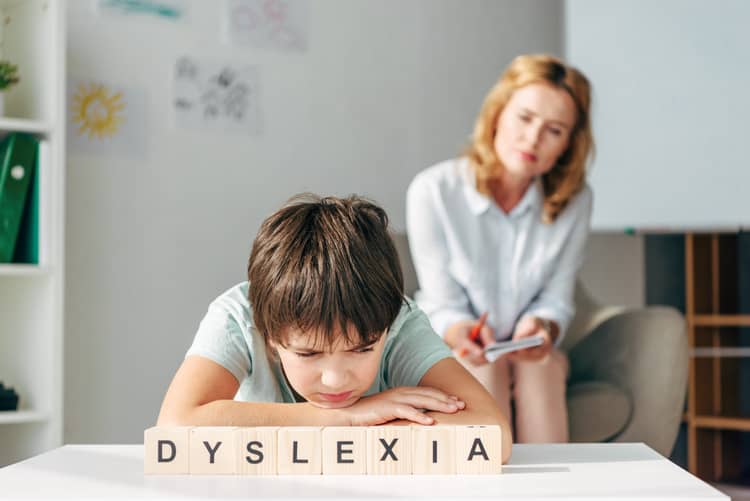
What is dyslexia and how does it arise - manifestations in reading disorder
In European countries, dyslexia affects approximately 8% of people, while according to the European Association, up to 20% of the European population actually has problems with dyslexia. Many of them just don't have it officially diagnosed. Many parents are frightened by the word dyslexia in relation to their child. This biologically determined disorder manifests itself in the fact that the child cannot associate letters with their sound form, so he knows the letter, but cannot identify which one it is. The result is a misunderstanding of the text and a reading disorder. Given that dyslexia has a significant impact on the child's learning and overall academic development, early diagnosis and choosing the right pedagogical approach are important. What is reading for dyslexics? How to solve reading disorders? How does dyslexia arise?
Parents come into contact with the term dyslexia most often in preschool age or when their child starts elementary school. There are three types of parents, those who ignore the symptoms of dyslexia, those who perceive the presence of dyslexia but do not understand the obstacles themselves, and then those who understand dyslexia and can objectively perceive the obstacles it represents for the child. How to recognize the signs of dyslexia? Does dyslexia manifest itself in adulthood?
What is dyslexia?
In our conditions, dyslexia has the status of a learning disability, in contrast to countries such as the USA, Sweden or Great Britain, where dyslexia is understood as a handicap and is officially categorized as a disability. In such conditions, there is much more room for more comprehensive help to be provided to children/people affected by dyslexia - similarly to people with mental or physical disabilities.
Dyslexia itself represents an impaired ability to acquire the skill of reading. This is a problem in decoding letters and their sound form (no association). Associated reading disorders, incomprehensibility of the read text are also related to this, and from the point of view of further personal and academic development, the inability to understand the read text is a problem. To a marked or less significant degree, dyslexia can thus contribute to making further learning more difficult. This is also why dyslexia, dysgraphia (a writing disorder), dystography (a disorder in understanding the rules of spelling) or dyscalculia (a calculation disorder) can occur together.
We understand dyslexia primarily as a developmental reading disorder, and other manifestations that may appear as a result of dyslexia are also related to this. Problematic reading is a problem in a wide range of school subjects. Early diagnosis, ideally by the 3rd year of primary school and the use of appropriate pedagogical methods, will ensure that many children will be able to eliminate serious complications with reading and understanding the text, because they will adopt appropriate educational strategies.

How dyslexia develops in children - the influence of genetics
How dyslexia arises in children is a relatively complicated process, because it is often a combination of various factors, but it is primarily conditioned by a genetic basis. Researchers are constantly investigating this disorder - handicap, and various studies are being carried out. Current findings point to differences in the parts of the brain that are responsible for recognizing language processes. Those parts of the brain that are normally engaged during reading in humans and are active in dyslexics do not work properly.
This developmental learning disorder is categorized as a disability in several countries precisely because an individual has a genetic predisposition to it. The proof should be that if the parents or at least one of them suffered from dyslexia in childhood, the probability of dyslexia in the child is higher. At the same time, dyslexia occurs much more often in boys than in girls, which may also point to a genetic cause. Dyslexia has no direct relationship with the individual's intelligence level. As part of the diagnosis, it is necessary to establish that reading disorders do not arise as a result of insufficient intellect in the child. In some cases, the child's laziness is also discussed, but this should not be confused with a learning disability. The subject of the investigation is the occurrence of dyslexia in connection with attention disorders, dysgraphia, dyscalculia, dysgraphia or hyperactivity of the child. Dyslexia is not only a phenomenon in children, but also persists into adulthood.
Types of dyslexia
Despite the fact that it is believed that dyslexia is primarily caused by genetic factors, this disorder can be divided into two main types - developmental dyslexia (inheritance) or acquired dyslexia.
- Developmental dyslexia - it is characterized by heredity, disorders of a neurological nature or the consequences of damage during birth.
- Acquired dyslexia - can occur after a severe accident, brain haemorrhage, stroke or severe trauma. It can thus be acquired during life.

Diagnosis and manifestations of dyslexia
Similar to other disorders or diseases, early diagnosis is very important. The earlier the reading disorder is detected, the greater the chance that appropriate procedures (methods) will be chosen and the child will not have such noticeable complications in further development. Symptoms of dyslexia can be observed already in preschool age. Of course, the parent does not necessarily attribute such symptoms to the fact that the child should have problems with reading and further education at school.
Even before starting school, symptoms of dyslexia can be, for example, problems with expanding the vocabulary, delay in the development of speech, confusing the meaning of words, problems with remembering the order of numbers, colors or letters. Of course, each child is individual and these symptoms do not always mean that the child will suffer from dyslexia or other disorders. However, if it is a combination of several factors, it does not hurt to consult an expert - pediatrician, speech therapist or child psychologist.
Most often, diagnosis occurs during the first years of elementary school, when the teacher himself plays an important role. At school, he sees how the child works, how he develops and gets rid of any shortcomings during adaptation to the educational process. Therefore, cooperation and communication between parents and teachers is important in order to avoid further difficulties and to detect possible disorders. It is true that each case is specific. In general, it is advisable if dyslexia can be diagnosed by the third year of primary school. For this purpose, a test for dyslexia is used, which includes special tasks, a reading and language literacy test, and in some cases the child also undergoes special tests by a psychologist. With early diagnosis, there is room for setting up appropriate therapy.
Typical manifestations related to dyslexia are significant problems with spelling and letter recognition, significantly worse reading literacy compared to peers, the child does not remember the sequence of letters in a word and does not know the meaning of words, it is difficult to compose sentences, the student takes longer to complete tasks, the child avoids answers, does not want to read, and problems with spelling also appear over time. Problems with dyslexia and understanding meaning can be combined with other learning disabilities.

Reading disorder - dyslexia and its treatment
First of all, it is important that parents do not panic when dyslexia is diagnosed. The fact that a child is dyslexic does not mean that he has to be worse than others. Learning disabilities can be mitigated and in some cases to such an extent that the differences between a child with dyslexia and healthy peers disappear completely. If your child's dyslexia is confirmed, it is advisable to consult a teacher and seek professional help - a special teacher, psychologist, speech therapist and professional special educational centers will properly test the child, and thanks to this, it will be possible to set up appropriate treatment and establish optimal learning strategies.
The diagnostic assessment should also include examinations by an ear and eye doctor to rule out possible hearing or vision disorders. Communication with the teacher and experts is important. The parent himself must be able to describe how home schooling takes place. Close communication with the teacher, in turn, makes it possible to adapt the demands placed on such a student. Motivate and support children, definitely do not compare them with others and do not make them feel that they are inferior. Even if the effort culminates in bad grades.
The treatment of dyslexia itself does not have a uniform procedure. Several experts use different educational and learning strategies. It is important to understand that hereditary dyslexia cannot be completely cured. It is a brain condition, but if it is possible to come up with the principles on the basis of which the student can work and learn, and appropriate strategies are established, the symptoms of dyslexia can be significantly reduced and sometimes even eliminated. Despite the fact that in some countries dyslexia is understood as a disability, these countries have much more developed support programs that ensure optimal conditions for the development of children with such a learning disability. A child with dyslexia can be just as successful as other children.

Dyslexia prevention and advice for parents
Despite the fact that dyslexia can usually be diagnosed, i.e. detected only at the moment when several accompanying symptoms appear, it is possible to apply certain procedures to alleviate them, which can have a positive effect.
It is best to start practicing language and reading skills with your child as early as possible. It is ideal to combine letter learning and speech development so that the child also learns the sound form of letters - words. It is convenient if you read aloud to the child, and calmly while he still does not understand the meaning of the words. The method of matching the letter to the pictures on which the letter itself is located is effective. The child thus visualizes the letter and creates an association.
Parents must not forget the positive motivation of children, praise and recognition even for minor progress are very encouraging and motivate the child to progress. Last but not least, at the beginning of schooling, communication and cooperation between parents and the school is important, or with the teacher. Regular practice of reading skills is the alpha and omega, build a positive attitude towards reading in the child.
It is good if you connect with a group of parents whose children suffer from dyslexia or other learning disabilities. You can find such parents in closed groups on social networks. If you have the opportunity to consult with parents who have solved/are solving a similar problem, it is not a guarantee that everything they advise will be able to be used in your case, but practical experience can often be very helpful.
Dyslexia and reading disorders - experiences
More and more parents are encountering the occurrence of dyslexia in children. Many parents also confirm that dyslexia is a lifelong problem and deficiencies in reading expression continue to show in adulthood when, for example, reading takes longer. The only effective method is regular practice and patience. Occasional bad grades should not be a reason for demotivation. Several discussants also state that their children were diagnosed with dyslexia in combination with other learning disabilities, e.g. dysgraphia or hyperactivity. Last but not least, the discussions point to the fact that although it is difficult with children at certain stages and dyslexia complicates their academic development, with appropriate methods their children have grown into people with successful careers.
The most frequent questions - FAQ
Do you know what dyslexia means in a child? Can dyslexia be treated and what are its symptoms? Does dyslexia persist in adulthood? You will find the answer to all this in our article. If you, as a parent, have experience with dyslexia in your child, we will be very happy if you share your own experience - advice, tips and recommendations. In many cases, you can help other parents. All you have to do is join the discussion under the article.
What is dyslexia?
What are dyslexia and dysgraphia?
Is dyslexia hereditary?
How does dyslexia arise?
Pridať komentár





